#shopman
Text
‘I have your plates,’ he said, holding out a green-baize parcel. ‘Oh, thank you, thank you, Stephen. What a good fellow you are. Here’s elegance, damn my eyes. How they shine! Oh, oh,’ his face fell. ‘Stephen, I do not like to seem ungrateful, but I did say hawser-laid, you know. The border was to be hawser-laid.’ ‘Well, and did I not say, “Let there be a hawser about the periphery” and did he not say, the shopman, God’s curse upon him, the thief, “Here, sir, is as pretty a hawser as Lord Viscount Nelson himself could desire”?’ ‘And so it is. A capital hawser. But surely my dear Stephen, you must be aware, after all this time at sea, that a hawser is cable-laid, not hawser-laid?’ ‘I am not. And I absolutely decline to hear more of the matter. A hawser not hawser-laid – what stuff. I badger the silversmith early and late, and we are to be told that hawsers are not hawser-laid. No, no. The wine is drawn, it must be drunk. The frog has neither feathers nor wool, and yet she sings. You will have to sail up to the Downs, eating the bread of affliction off your cable-laid baubles, and wetting it with the tears of misery; and I may tell you, sir, that you will eat it without me. Essential business calls me away. I shall put up at the Grapes, when I am in London: I hope to be there well before Michaelmas. Pray send me a line. Good day to you, now: God bless.’
Post Captain, Patrick O’Brian
97 notes
·
View notes
Text
The Duck with the Golden Eggs
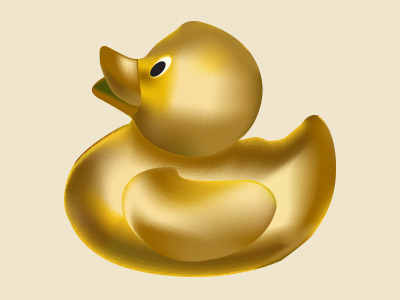
Here's an interesting take on the Golden Goose. This is a Russian Folktale about a poor man who finds a duck who lays golden eggs. He gets himself and his family out of poverty with these daily eggs. However, it's discovered that whomever eats the duck becomes Tsar (King). Russian and Slavic Folk tales have a reputation of being very brutal, but this is a very tame one.
Ducks in Magic tend to have connections to emotions as these birds are well known to swim, thus connecting them to the water element. Serving duck related items promotes Emotional Clarity, Emotional Comfort, and Emotional Exploration. It also promotes Affection, Communication, and Opportunities.
Once upon a time there lived an old man named Abrosim, with his old wife Fetinia: they were in great poverty and want, and had a son named Ivanushka, who was fifteen years of age. One day the old man Abrosim brought home a crust of bread for his wife and son to eat; but hardly had he begun to cut the bread than Krutchina (Sorrow) sprang from behind the stove, snatched the crust out of his hands and ran back. At this the old man bowed low to Krutchina, and begged her to give him back the bread as he and his wife had nothing to eat. Old Krutchina answered: “I will not give you back the bread; but I will give you instead a duck, which lays a golden egg every day.”
“Well and good,” said Abrosim; “at all events I shall go to bed without a supper to-night; only do not deceive me, and tell me where I shall find the duck.”
“Early in the morning, as soon as you are up,” replied Krutchina, “go into the town and there you will see a duck in a pond; catch it and bring it home with you.” When Abrosim heard this, he laid himself down to sleep.
Next morning the old man rose early, went to the town, and was overjoyed when he really saw a duck in the pond: so he began to call it, and soon caught it, took it home with him, and gave it to Fetinia. The old wife handled the duck and said she was going to lay an egg. They were now both in great delight, and, putting the duck in a bowl, they covered it with a sieve. After waiting an hour, they peeped gently under the sieve and saw to their joy that the duck had laid a golden egg. Then they let her run about a little on the floor; and the old man took the egg to town to sell it; and he sold the egg for a hundred roubles, took the money, went to market, bought all kinds of vegetables, and returned home.
The next day the duck laid another egg, and Abrosim sold this also; and in this way the duck went on, laying a golden egg every day, and the old man in a short time grew very rich. Then he built himself a grand house, and a great number of shops, and bought wares of all sorts, and set up in trade.
Now, Fetinia had struck up a secret friendship with a young shopman, who did not care for the old woman, but persuaded her he did to make her give him money. And one day, when Abrosim was gone out to buy some new wares, the shopman called to gossip with Fetinia, when by chance he espied the duck; and, taking her up, he saw written under her wing in golden letters: “Whoso eats this duck will become a Tsar.” The man said nothing of this to Fetinia, but begged and entreated her for love’s sake to roast the duck. Fetinia told him she could not kill the duck, for all their good luck depended upon her. Still the shopman entreated the old woman only the more urgently to kill and cook the duck; until at length, overcome by his soft words and entreaties, Fetinia consented, killed the duck and popped her into the stove. Then the shopman took his leave, promising soon to come back and Fetinia also went into the town.
Just at this time Ivanushka returned home, and being very hungry, he looked about everywhere for something to eat; when by good luck he espied in the stove the roast duck; so he took her out, ate her to the very bones, and then returned to his work. Presently after, the shopman came in, and calling Fetinia, begged her to take out the roast duck. Fetinia ran to the oven, and when she saw that the duck was no longer there she was in a great fright, and told the shopman that the duck had vanished. Thereat the man was angry with her, and said: “I’ll answer for it you have eaten the duck yourself!” And so saying he left the house in a pet.
At night Abrosim and his son Ivanushka came home, and, looking in vain for the duck, he asked his wife what had become of her. Fetinia replied that she knew nothing of the duck; but Ivanushka said: “My father and benefactor, when I came home to dinner, my mother was not there; so, looking into the oven, and seeing a roast duck, I took it out and ate it up; but, indeed, I know not whether it was our duck or a strange one.”
Then Abrosim flew into a rage with his wife, and beat her till she was half-dead, and hunted his son out of the house.
Little Ivan betook himself to the road, and walked on and on, following the way his eyes led him. And he journeyed for ten days and ten nights, until at length he came to a great city; and as he was entering the gates, he saw a crowd of people assembled, holding a moot; for their Tsar was dead, and they did not know whom to choose to rule over them. Then they agreed that whoever first passed through the city gates should be elected Tsar.
Now just at this time it happened that Little Ivan came through the city gates, whereupon all the people cried with one voice: “Here comes our Tsar!” and the Elders of the people took Ivanushka by the arms, and brought him into the royal apartments, clad him in the Tsar’s robes, seated him on the Tsar’s throne, made their obeisance to him as their sovereign Tsar, and waited to receive his commands. Ivanushka fancied it was all a dream; but when he collected himself, he saw that he was in reality a Tsar. Then he rejoiced with his whole heart, and began to rule over the people, and appointed various officers. Amongst others he chose one named Luga, and calling him, spoke as follows: “My faithful servant and brave knight Luga, render me one service; travel to my native country, go straight to the King, greet him for me, and beg of him to deliver up to me the merchant Abrosim and his wife; if he gives them up, bring them hither; but if he refuses, threaten him that I will lay waste his kingdom with fire and sword, and make him prisoner.”
When the servant Luga arrived at Ivanushka’s native country he went to the Tsar, and asked him to give up Abrosim and Fetinia. The Tsar knew that Abrosim was a rich merchant living in his city, and was not willing to let him go; nevertheless, when he reflected that Ivanushka’s kingdom was a large and powerful one, fearing to offend him, he handed over Abrosim and Fetinia. And Luga received them from the Tsar, and returned with them to his own kingdom. When he brought them before Ivanushka, the Tsar said: “True it is, my father, you drove me from your home; I therefore now receive you into mine: live with me happily, you and my mother, to the end of your days.”
Abrosim and Fetinia were overjoyed that their son had become a great Tsar, and they lived with him many years, and then died. Ivanushka sat upon the throne for thirty years, in health and happiness, and his subjects loved him truly to the last hour of his life.
#Food and Folklore#Russian fairytale#Fairytale#Duck#golden duck#golden egg#Tsar#folktale#Kitchen Witch#Kitchen Witchcraft#pagan#October#Klickwitch#witch#story
10 notes
·
View notes
Text
A Swell Time

The actor Edward Askew Sothern as 'Lord Dundreary', carte de visite c. 1876 (Flickr). There are many pictures of Sothern striking comic poses in-character as Dundreary.
Although the corseted Dandy was not extinct by any means, his place in the public eye was now taken by the Heavy Swell, for whom the character of ‘Lord Dundreary’ (in Tom Taylor’s Our American Cousin) as portrayed by E. A. Sothern, in 1861, served as the perfect model. Never before or since has an actor in a single part had such an effect on Fashions. Not only the immortal whiskers but the affected pose and manners and languid drawling lisp were borrowed from Lord Dundreary who might almost be said to have turned the Dandy into the Heavy Swell.
— Phillis Cunnington and C. Willett Cunnington, on men's fashion of the 1860s, in Handbook of English Costume in the 19th Century
The Heavy Swell is also a standard of John Leech's midcentury comics, which is how I encountered him.
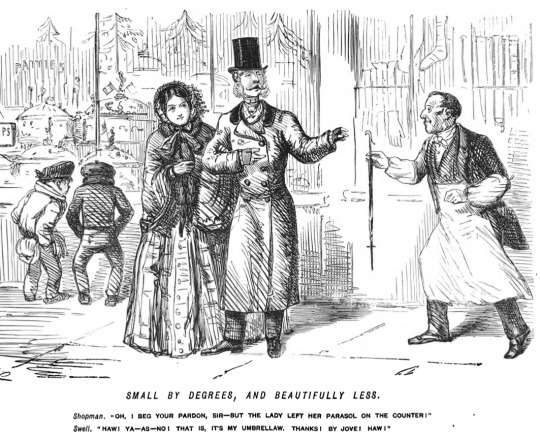
Shopman. "Oh, I beg your pardon, sir—but the lady left her parasol on the counter!"
Swell. "Haw! Ya–as–no! That is, it's my umbrellaw. Thanks! By Jove! Haw!"
See also: "Good gwacious!" and even MIWACKULOUS. The character type and distinctive lisp/drawl was established in the 1850s before Lord Dundreary parodied it at its height. But how did the word swell come to describe this well-off gentleman—a real gentleman, even if he has his foibles—from its usage a few decades prior?
The 1823 edition of Classical Dictionary of the Vulgar Tongue defines a swell as, "A gentleman; but any well-dressed person is emphatically termed a swell, or a rank swell. A family man [thief] who appears to have plenty of money, and makes a genteel figure, is said, by his associates, to be in Swell-street." The well-dressed criminal swell is the model for Mr. Easthupp from Frederick Marryat's Mr. Midshipman Easy (1836), a purser's steward with a background as a pickpocket. Easthupp is called a swell, and several times he's said to be from "the swell mob," which is clearly referring to low-life society.
When Easthupp is (non-fatally) wounded in a duel, he confesses:
"Oh dear! oh dear! what a fool I was; I never was a gentleman—only a swell: I shall die; I never will pick a pocket again—never—never—God forgive me!"
Even in the late 1840s, a guide to brothels was called "The New Swell's Night Guide."

"With Numerous Spicy Engravings". Maybe John Leech's swells are less innocent than I thought?
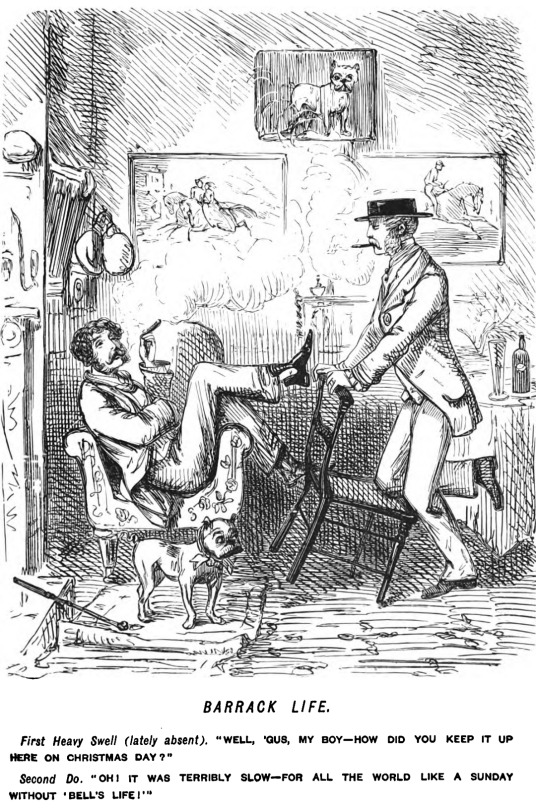
"Barrack Life", 1851. Feat. two Heavy Swells.
#1860s#1850s#fashion history#swells#victorian#john leech#lord dundreary#fashion#caricatures#language#frederick marryat
31 notes
·
View notes
Text
"Last Monday and Tuesday a considerable number of shopman and boys paraded the street of this town, with shoe-ties of different colours in their shoes; some black others pink, yellow, &c. accompanied by an ass, with shoe-ties a little above his hoofs on his fore feet; passing along the streets, they met a macaroni with large shoe-ties, and hailed him, "Holla, brother strings, will you take company?" He passed on at a brisk rate; they pursued with shouts and hissings, till he took shelter is a tavern, where they gave him another holla or two, calling out, "Brother strings;" the master of the tavern came out seemingly much displeased, and asked what they wanted? They said, "This gentleman's brother (pointing to the ass) is in the tavern, and he wishes to shake hands with him." The gentleman not chusing to come out, threw his strings out of the tavern window, and the shopmen departed well pleased in having exposed his effeminacy."
~ Public Advertiser, 31 July 1788
#and everybody clapped#again we see that the hatred of macaroni was transparently about gender nonconformity#macaroni#fashion history
13 notes
·
View notes
Note
Hmm 🤨 Sex Shop or Fire Department me thinks

— It was a dare: to go to a sex shop and buy something. Rhaenyra planned do it fast and never come back there, but she didn't except a shopman being so handsome and helpfull. But alas, he was, and despite better judgment she became a frequent visitor and buyer, despite being a virgin and have no use to almost everything she bought.
But talking and seeing Daemon, a handsome salesman and owner of the shop, was worth it. —
#daemyra#daemon x rhaenyra#rhaenyra × daemon#matt smith#milly alcock#hotd#daemon targeryan#rhaenyra targaryen
12 notes
·
View notes
Photo
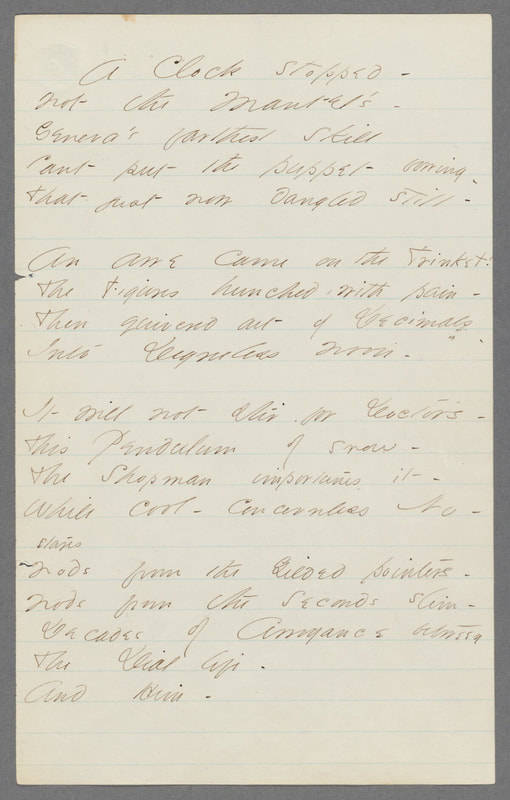
A Clock stopped --
Not the Mantel's --
Geneva's farthest skill
Cant put the puppet bowing --
That just now dangled still --
An awe came on the Trinket!
The Figures hunched, With pain --
Then quivered out of Decimals --
Into Degreeless Noon --
It will not stir for Doctor's --
This Pendulum of snow --
The Shopman importunes it --
While cool -- concernless No --
Nods from the Gilded pointers --
Nods from the Seconds slim --
Decades of Arrogance between
The Dial life --
And Him --
Emily Dickinson, J287 (1861). Manuscript here.
16 notes
·
View notes
Text
ㅤIn her letter Peter’s mother first sent him her blessing, then greetings from everybody, and the news of his godfather’s death; and at the end she added that Aksínya (Peter’s wife) had not wished to stay with them, but had gone into service, where they heard she was living well and honestly. Then came a reference to that present of a rouble; and finally, in her own words, what the old woman, with tears in her eyes and yielding to her sorrow, had dictated and the church clerk had taken down exactly, word for word:—
ㅤ“One thing more, my darling child, my sweet dove, my own Peterkin! I have wept my eyes out lamenting for thee, thou light of my eyes. To whom hast thou left me? …” At this point the old woman had sobbed and wept, and said: “That will do!” So the words stood in the letter; but it was not fated that Peter should receive the news of his wife's having left home, nor the present of the rouble, nor his mother's last words. The letter with the money in it came back with the announcement that Peter had been killed in the war, defending his Tsar, his Fatherland, and the Orthodox Faith. That is how the army clerk expressed it.
ㅤThe old woman, when this news reached her, wept for as long as she could spare time, and then set to work again. The very next Sunday she went to church, and had a requiem chanted, and Peter’s name entered among those for whose souls prayers were to be said; and she distributed bits of holy bread to all the good people, in memory of Peter the servant of God.
ㅤAksínya, the soldier’s widow, also lamented loudly when she heard of her beloved husband’s death, with whom she had lived but one short year. She regretted her husband, and her own ruined life; and in her lamentations mentioned Peter’s brown locks and his love, and the sadness of her life with her little orphaned Vánka; and bitterly reproached Peter for having had pity on his brother, but none on her—obliged to wander among strangers!
ㅤBut in the depth of her soul Aksínya was glad of her husband’s death. She was again pregnant by the shopman in whose service she was living; and no one would now have a right to scold her, and the shopman could marry her as, when he was persuading her to yield, he had said he would.
ㅤ— Leo Tolstoy, from Chapter VIII in Hadji Murad, trans. Aylmer Maude.
2 notes
·
View notes
Note
📼
[A child, not over eight years old, is walking into a town, a sign has the name of the town written on it, but the child does not know how to pronounce it. They know how to write and read, but talking is hard.
They are in this town to buy more clothes, as they are growing quite fast. A Poochyena pup is following them. They make sure to enter a general shop with a "Pokémon Allowed" sign on it.
The child might not be able to talk to humans, but Pokémons understand them perfectly. It is why the Poochyena knows what to do. The child comes in front of the cashier and shows a candy bar.]
"You want a Mirage candy ?" [the shopman asks and the child nods. They do not care about the candy, but it is nice to know how it is pronounced.] "You're not a talker, huh."
[They mouthed a yes. He could say that, yes. They pay the man, with the money they had found on their way, and greet them goodbye with their hands before running, the Pokémon behind them. The Poochyena has a dress in his mouth]
"HEY ! MIRAGE KID ! COME BACK, YOUR POKEMON STOLE ME ! THAT THING IS A THIEF !" [the man is yelling at the top of his lungs, in vain, because the child is not coming back, ever.
Huh, Mirage ? That was a good name. Not that so for a candy. And Mirage smiles and laughs without a sound, running with their friend.]
2 notes
·
View notes
Text
‧⁺✧ Dane Whitman/Steven Grant ♡°‧
title: History Chatting (link to AO3)
wordcount: 1354
rating: G
tags: fluff, meet-cute, museums
It’s Dane’s first day at the National Art Gallery. Before even entering his new office, he makes an enticing acquaintance.
‧ ─────────── ⋆⋅☽⋅⋆ ─────────── ‧
The National Art Gallery’s lobby was truly something else. The morning sun poured its light generously through the large windows in the stone hall with its Ionic and Doric columns, tinting the air with a soft golden glow. Still it was cooler in here than outside, thank God. Just one of the perks of having a workplace that required all rooms to be around twenty degrees at all times.
It had been the same at the Natural History Museum – but its lobby wasn’t half as welcoming as these beautiful columns, combining modern elements with ancient artefacts. There was an unmatched beauty in having history greet the visitors right up front.
Dane adjusted the satchel over his shoulder. His office was in the East Wing, just past the Egyptian exhibit. There was a charming little gift shop right by the entrance. Very strategic position. He stopped to glance at all the different products laid out on broad white tables and small glass shelves.
Big black Egyptian cats, like he knew from cartoons, and little pyramid keychains… Other than that, Dane found he recognised awfully few of the objects, or hieroglyphics.
Shily, he glanced at the till to see if the shopman was giving him looks. He wasn’t, the man was busy adjusting books on a shelf, with his back to the hall.
And then, maybe, Dane might have stolen another glance.
The man was completely immersed in his task. His long fingers moved delicately along the books’ spines, carefully, almost as if they’d tatter if he wasn’t as gentle. A dark coil of his curly hair had fallen into his face, in front of large brown eyes – Dane looked down quickly when he realised how shamelessly he was staring.
It made his eyes fall onto a basket with little plush hippos in Egyptian outfits. They had such cute little eyes that Dane’s face actually broke into a smile. He stepped closer to look at them.
The shopman looked over his shoulder. “Oh. Mornin’.”
Taken aback, Dane gave him a quick smile before taking one of the hippos in his hands. “Good morning. These are adorable. Is it a specific deity?”
“Uh, yes, Taweret,” the shopman said, practically flying toward Dane from his side of the counter. “Egyptian Goddess of fertility and rejuvenation. Yeah, she is pretty cool.”
“All of this stuff is, actually,” Dane said with a look around. “The cats and crocodiles… so many animals in Egyptian mythology.”
The shopman – Steven, according to the nametag on his uniform – lit up with a gorgeous smile across his face. He looked smaller than he was because his head was ducked at the time. “Yeah, that is pretty excitin’,” he said in just a slightly off-sounding accent. “It’s an iconography thing, to visually distinguish the different gods and their personalities and all that jazz. So, each god matches the personality and powers of their animal, in a way. Sachmet is a lioness, for example. The, uh, goddess of war.”
Throughout this explanation, his brown eyes have never left Dane – and it made his brain squishy, apparently, because before he could think about it, he asked, “Do you have, um – there’s not a giraffe deity, by any chance?”
Steven leaned back with a grimace and exhaled loudly. “Not that I know, no.” He blinked and tilted his head. “I mean, I’m not saying it doesn’t exist just because I haven’t heard of it – that would be insane – but giraffes do appear in ancient artwork, and, and some nobles had them as pets, I suppose.”
He moved his shoulders a lot when speaking, Dane noticed with a down-played smile. “I see. I’m afraid I don’t know anything about Ancient Egypt. Kind of omitted that during my studies. Shabby treatment for a few thousand years of high culture,” he sighed.
“Well, I mean Egyptology isn’t everybody’s gusto, it can’t be,” Steven shrugged. “Maybe it just… isn’t as cool.”
“Yeah, well, the Middle Ages aren’t either,” Dane sighed. “Modern historians worry about the legitimacy of a letter they dug up among a hundred others, meanwhile a medievalist will have to work with a paragraph about a vision someone’s cousin’s grandfather has had half a century earlier.”
Steven chuckled. “That’s… that’s funny,” he smiled, looking up at Dane all awkwardly despite being broader and probably larger than him. There was something profoundly awkward about him, something jittery, like he was prepared to flee this conversation at any moment.
Dane couldn’t let that happen. They could just as well get acquainted now. “I’m Dane Whitman.”
Steven shook his extended hand with wide eyes and an even wider smile. “Oh, the professor!” he beamed, his angular face all soft. “You’re the new curator for the medieval exhibit, now it all makes sense.”
“That’s right,” Dane mumbled through a smile, finding he was unable to say much more.
“Oh, brill, how funny to run into you here. Pleasure to meet you!”
“And you. You are…?”
“Oh! Sorry.” Taken aback, he fumbled at his nametag. “Steven. Grant. No don, or PhD. Just the, uh, gift shop-ist.”
Dane held up the plush hippo in his hand. “Guardian of the sacred artefacts.”
It made Steven smile at the counter. “Well, um – that’s a nice way of puttin’ it.”
“I’ll take one of the hippos, please,” Dane decided.
“Yes, of course. One Taweret to go. And, oh, would you care for one of these bags of sweets?” Steven said and shoved a little basket with colourful gums in Dane’s direction. “I was told to sell these, even though they didn’t have stuff like this back then, obviously. Just figs and dates and such. People seem to gleefully block that out.”
“Urgh, tell me about it,” Dane sighed, both jokingly and sympathetically. “You wouldn’t believe how many people think that Anglo-Saxons lived off potatoes or something.” He picked one of the bags. “I mean, with these it’s even more outrageous. Obviously. Who thinks of that?”
Steven softened around his big brown eyes. “Right?” he smiled, just a tad too late. A tad too soft. Yet the moment of silence between them was warm instead of awkward.
“I’ll take one,” Dane said. “To appease your boss.”
Steven instantly cashiered his purchase. “Oh, may you be blessed. That woman needs all the appeasing she can get.” He gave Dane a look and paused to add in a low voice, “Don’t tell her I said that.”
Dane smiled. “Secret’s safe with me.”
Steven returned the smile when he handed him the plushie and sweets, fumbling with his long fingers when Dane touched them fleetingly. “S-sorry, I didn’t ask if you wanted a bag or…”
“I’ll be fine,” Dane assured him – and himself. Stop blushing!
“Okay,” Steven breathed and leaned back, hands still on the counter. “Again, pleasure to meet you, Professor.”
“Oh, please, just Dane.”
Steven smiled and fumbled with that dark lock that was back in his face, like he was failing to stroke it back. “O-okay. Just Steven, then, too.”
Dane smiled like his face was unable to show any other emotion than adoration. “’kay.”
“Cheers.”
On his way back to the hall, he stuffed both the hippo and the sweets into his bag – both of which Steven had been so enthusiastic to talk about. Was he always this scatter-brained. Or was he love-struck, too? Or both?
Dane inhaled and, bravely, stopped himself to bravely turn around. “Hey, Steven?” He was met with a pair of hopeful brown eyes meeting his, wide with surprise. “Yes?”
Dane shifted on his feet, taken aback. He’s so cute… “If you want to have a coffee break together later on…” he said, tilting his head.
Steven’s face lit up. “Oh, uh, sure. Yeah, fantastic, I’m, um – my next break is a-around, uh, four.”
“Four at the café then?”
“Yes, yes, lovely! I’ll be there!” Steven beamed with a wave of his lean hand.
“Nice. See you later then,” Dane said, returning the warmly nostalgic gesture. His face broke into a soft smile when he heard Steven add quietly, “Laters, gators.”
A good first day of work until now. Only Dane was running late… Worth it.
‧ ─────────── ⋆⋅☽⋅⋆ ─────────── ‧
If you liked this ficlet, consider leaving kudos on AO3 please ♡ Thank you for reading!
#dane whitman x steven grant#steven grant fanfiction#dane whitman fanfiction#moon knight#eternals#how do you tag these lmao#marvel
6 notes
·
View notes
Text
Monday 23 September 1833
8
12
fine morning F62° at 9 ¼ - breakfast at 9 ½ - sat over it reading Herschells’ astronomy – out at 12 – at the de H-s’ at 12 20 walked with Lady Harriet along the harbour towards Elsineur about 1 ½ hour – then called with her at comtesse Bluchers’ for 10 minutes, left her there and about 3 or before stopt at a booksellers’ in what Lady H- calls the Bond street of the place, about 1 ½ hour reading Catteaus’ work 4vols. 8vo. Paris Treuthel [Treuttel] and Wurtz 1804 I think – and looking over some other little things – asked 8 ecus for the work, and 1 ½ ecu for the mere reading of the work – an English work on Denmark London Cradock and Joy 1824 large 8vo. price 22 shillings English – some plates – forget the author’s name – Richards’ Itinéraire du nord was published in 1818 – a small guide book of Copenhagen (in English) 2 ecus – somehow the man tho’ very civil at first I had waited his coming for an hour the shopman could not speak French said he had business and must go and so got rid of me the English author mentions his obligation to Mr. Laing the university librarian – home at 4 ¾ - dinner at 5 40 – before and after reading and sleeping over to p. 31 Herschell (had read 20pp. in the morning) then at my travelling accounts till very near 11 – I had kept them in thalers of 30 [?] gr. instead of 18 gut gros (bon gros) to the thaler ever since entering Hasse – reduced them to this – very fine day – F65 ½° now at 11 p.m. -
1 note
·
View note
Text
Went to the market and the shopman starts speaking javanese
Me:

i don't understand you but ahaha yes
0 notes
Text
I think everyone expected to see a man emerge—possibly something a little unlike us terrestrial men, but in all essentials a man. I know I did. But, looking, I presently saw something stirring within the shadow: greyish billowy movements, one above another, and then two luminous disks—like eyes. Then something resembling a little grey snake, about the thickness of a walking stick, coiled up out of the writhing middle, and wriggled in the air towards me—and then another.
A sudden chill came over me. There was a loud shriek from a woman behind. I half turned, keeping my eyes fixed upon the cylinder still, from which other tentacles were now projecting, and began pushing my way back from the edge of the pit. I saw astonishment giving place to horror on the faces of the people about me. I heard inarticulate exclamations on all sides. There was a general movement backwards. I saw the shopman struggling still on the edge of the pit. I found myself alone, and saw the people on the other side of the pit running off, Stent among them. I looked again at the cylinder, and ungovernable terror gripped me. I stood petrified and staring.
A big greyish rounded bulk, the size, perhaps, of a bear, was rising slowly and painfully out of the cylinder.
As it bulged up and caught the light, it glistened like wet leather.
Two large dark-coloured eyes were regarding me steadfastly. The mass that framed them, the head of the thing, was rounded, and had, one might say, a face. There was a mouth under the eyes, the lipless brim of which quivered and panted, and dropped saliva. The whole creature heaved and pulsated convulsively. A lank tentacular appendage gripped the edge of the cylinder, another swayed in the air
Those who have never seen a living Martian can scarcely imagine the strange horror of its appearance. The peculiar V-shaped mouth with its pointed upper lip, the absence of brow ridges, the absence of a chin beneath the wedgelike lower lip, the incessant quivering of this mouth, the Gorgon groups of tentacles, the tumultuous breathing of the lungs in a strange atmosphere, the evident heaviness and painfulness of movement due to the greater gravitational energy of the earth—above all, the extraordinary intensity of the immense eyes—were at once vital, intense, inhuman, crippled and monstrous. There was something fungoid in the oily brown skin, something in the clumsy deliberation of the tedious movements unspeakably nasty. Even at this first encounter, this first glimpse, I was overcome with disgust and dread.
Suddenly the monster vanished. It had toppled over the brim of the cylinder and fallen into the pit, with a thud like the fall of a great mass of leather. I heard it give a peculiar thick cry, and forthwith another of these creatures appeared darkly in the deep shadow of the aperture.
The War of the Worlds — H. G. Wells
#The War of the Worlds#H. G. Wells#1898#science fiction#alien invasion#british imperialism#martians#mars#bookblr#bibliophile#bookworm#currently reading#booklr#atypicalreads#quotes#london#england#english literature#war of the worlds#books#aliens
0 notes
Text
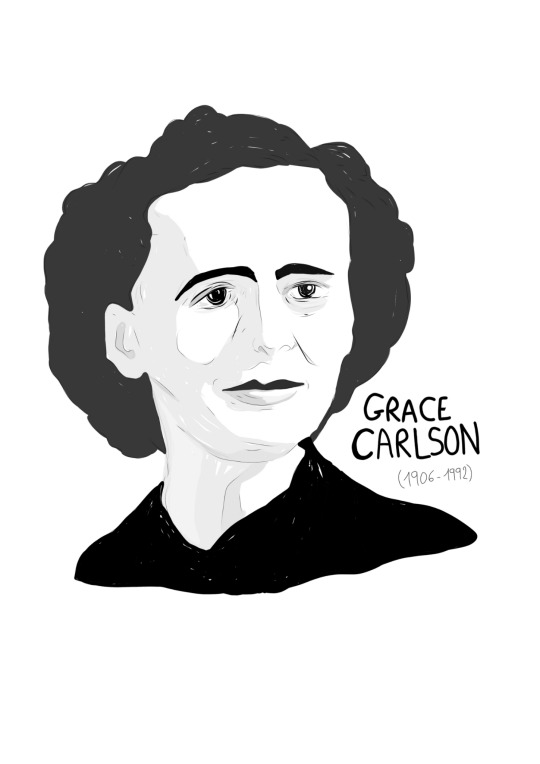
Grâce Carlson née en 1906 et grandi dans un quartier ouvrier catholique de St. Paul, Minnesota. C'est à la suite de deux grandes grèves que se forme son engagement envers la classe ouvrière : la grève nationale de 1922 " Shopman's Strike " met en branle 400 000 travailleurs de six syndicats de métiers associés aux chemins de fer et fait découvrir la solidarité ouvrière à Grâce alors qu'elle n'a que 15 ans. Le père de Grâce gréviste avait finalement repris le travail avant la fin de la grève, pour ne pas avoir d'ennuis avec les grévistes il amenait Grâce " traverser le piquet de grève" avec lui, Grâce trouvait cela si dérangeant qu'elle partie se confesser au prêtre pensant qu'elle avait ainsi « aidé à priver les ouvriers de leur salaire.>>.
Grâce étudie dans un collège catholique, mais les soeurs qui y enseigne sont des migrantes irlandaises soutenant la révolte contre la domination britannique et contre la guerre. Pour Grâce c'est une période de fort sentiment contre la Première Guerre mondial notamment au travers des chants antimilitariste.
En 1933 elle sort diplômée de l'université du Minnesota et avec sa sœur cadette Dorothy, elle rejoint le Social Problems Club de l'université et participe aux grèves anti-guerre du campus contre le #ROTC. Elle soutient le "Farmer-Labour Party", participe à une manifestation de chômeurs au Capitole et assiste aux débats trotskyste du dimanche.
En 1934, avec le Social Problems Club elle collecte des fond pour la grève des Teamsters de Minneapolis, la puissante grève qui va paralyser la ville malgré les violentes attaques contre les grévistes, pousse Grace vers les idées socialiste. Elle dira alors " mon admiration pour leur courage, leur capacité et leur intelligence m'a amenée à étudier leur programme et j'ai commencé à lire Debs, Trotsky, Lénine, #Marx et Engels ".
En 1938, elle est déléguée à la convention de fondation du #SocialistWorkersParty dirigée par James P Cannon. En 1940, elle quitte son emploi pour travailler à plein temps pour le parti. Elle dirige alors des campagnes politique, écrits pour la presse du parti, devient oratrice, écrivaine, et une
0 notes
Link
Nếu như nữ giới có vô số lựa chọn cho phong cách thời trang của mình từ thời trang dạo phố, thời trang công sở đến đi chơi. Với nam giới lại không được phong phú như vậy. Họ thường chỉ bó hẹp trong việc chọn cho mình những bộ đồ tây hoặc chiếc quần jean dành cho cả đi chơi và đi làm. Tuy nhiên, bên cạnh việc chọn quần jeans theo dáng người thì các chàng cũng nên sắm cho mình những mẫu quần thật thời trang.
1 note
·
View note
Photo


Premixy
Palenie e-papierosa jest dla Ciebie chwilą relaksu i przyjemności? Lubisz próbować nowych smaków, które zwiększają satysfakcję z palenia? Jeśli tak to Shopman jest idealnym miejscem dla Ciebie! Sklep z e-papierosami Shopman powstał z myślą o współczesnych mężczyznach, którzy lubią moment zaciągnięcia się aromatycznym dymem. Premixy, bazy i aromaty to ciekawy temat dla twórców i dla osób, które chcą być na bieżąco z wszelkimi nowościami na rynku. Jeśli próbowanie nowych premixów stało się dla Ciebie hobby, a ich wygląd również zachęca Cię do kupowania, to w naszym sklepie znajdziesz premixy od najlepszych marek w najciekawszych wariantach smakowych!
Premixy — najciekawsze smaki
W ofercie naszego sklepu można znaleźć najbardziej kreatywne mieszanki smaków opakowane w designerskie i estetyczne opakowania. W naszej ofercie znalazły się premixy od najlepszych i zaufanych marek: Charlie’s Chalk Dust, American Pie, Bang i wiele innych. Wśród nich można znaleźć owocowe smaki, jak i te oryginalne np. kawa, donut, popcorn i wiele innych.
Premixy ze sklepu z e-papierosami Shopman
Wszystkie najciekawsze smaki premixów można znaleźć na naszej stronie internetowej. Mamy też bogaty wybór akcesoriów dla osób, które chcą tworzyć swoje kompozycje smakowe. Bazy, aromaty, CBD — wszystkie są dostępne w naszej ofercie.
1 note
·
View note